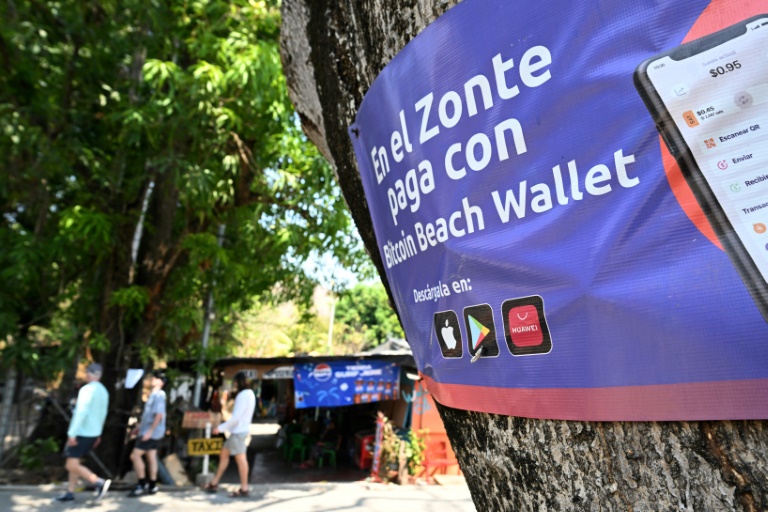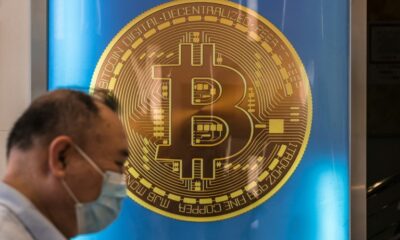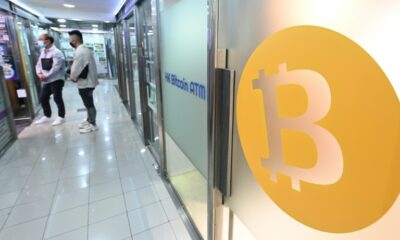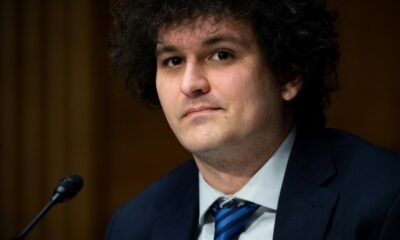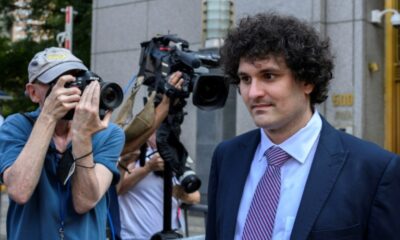In a surf town in El Salvador nicknamed “Bitcoin Beach,” shopkeeper Maria Aguirre watched with delight as the cryptocurrency — and her investment in it — recently soared to new all-time highs.
The digital currency that she acquired four years ago for $2,200 is now worth around $19,000, she said.
The price increase “has been great and I’m very happy,” the 53-year-old told AFP in El Zonte, where tourists relax on the beach and surfers ride waves.
The cryptocurrency has been legal tender since 2021 in the Central American nation, and a sign in Aguirre’s store selling food and soft drinks tells customers: “Bitcoin accepted.”
She said bitcoin’s rise had brought her more “economic stability,” and her investment gains enabled her to buy a washing machine, a stove and a refrigerator.
Aguirre’s store is surrounded by other small businesses that also accept bitcoin, as well as the US dollar, which replaced the national currency — the colon — in 2001.
Located 58 kilometers (36 miles) southwest of the capital San Salvador, El Zonte gained its nickname due to its widespread early use of the cryptocurrency for payments.
“Bitcoin Beach” is also the name of an application used in the area to make transactions.
In 2021, El Salvador became the world’s first country to establish bitcoin as legal tender, at the initiative of President Nayib Bukele, who has hailed the cryptocurrency’s recent strong performance.
Bitcoin hit an all-time high above $73,000 last week, helped by US authorities’ decision to allow greater trading accessibility, though it has since given back some of its gains.
The same day, Bukele announced that his country had stored more than $400 million in the digital asset in an offline “cold wallet,” which he described as “our first bitcoin piggy bank.”
– ‘Distrust of volatility’ –
Bukele made bitcoin an official currency in an attempt to revitalize a dollarized economy dependent on remittances from abroad, despite warnings from the International Monetary Fund and the World Bank about its extreme volatility.
But not everyone in El Salvador is convinced by the cryptocurrency.
According to a survey by Central American University, 88 percent of Salvadorans said that they did not use bitcoin in 2023.
“What’s clear is that people continue to use more traditional methods of sending (funds) and that has a lot to do with people’s distrust of the volatility of the cryptocurrency,” independent economist Cesar Villalona told AFP.
When Bukele introduced bitcoin, he also wanted remittances from families abroad — a key pillar of the Salvadoran economy — to be channeled through digital wallets to reduce transfer costs, but that did not happen.
In 2023, only one percent of the more than $8 billion in remittances arrived through digital wallets, according to the central bank.
On the side of a road in El Zonte, Blanca Castillo runs a store selling artificial flowers and natural juices.
She is also delighted with bitcoin and the financial gains it has brought her.
However, the 25-year-old is also wary of the cryptocurrency’s wild swings.
“When you see that the value is going to fall, you feel that you’re going to suffer losses… you have to be alert to its movements,” Castillo said.
At the end of 2022, bitcoin was trading under $17,000 — far below a previous record high.
Sitting on a chair in her small restaurant, owner Rosalina Franco said she serves many customers who pay with bitcoin, mostly foreign tourists.
The 70-year-old said she struggled with carrying out cryptocurrency transactions by phone, so “I save what I charge in bitcoin. I don’t spend it.”

 Business4 months ago
Business4 months ago
 Business5 months ago
Business5 months ago
 Events3 months ago
Events3 months ago
 People4 months ago
People4 months ago
 Events6 months ago
Events6 months ago
